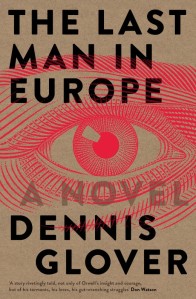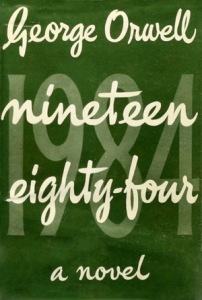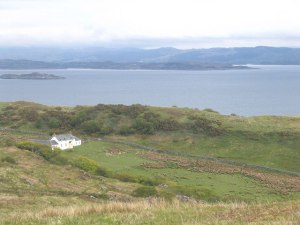
As I wrote in my previous post about the launch of Dennis Glover’s The Last Man in Europe at The Bookshop at Queenscliff, this novel is a fictionalised account of George Orwell’s life when he was writing 1984, (which was originally going to be called The Last Man in Europe). It’s an unusual kind of historical fiction, sticking closely to the historical record, exploring influences on Orwell’s writing, and supplemented with Glover’s imaginative reconstructions. It’s a book to appeal to Orwell enthusiasts and those familiar with his works especially 1984, but as to how it might work for people who haven’t read Orwell, I can’t say.
I think, however, that it’s actually quite courageous to write a book like this about such a famous author. Amongst his other accomplishments (see my previous post) Glover is a scholar of Orwell, but so are countless others, and there will be experts who read this looking for flaws rather than enjoying the ride. The advantage for the everyday reader like me is that pressure like that means we can assume that the facts are not in contention.

1949 first edition (Wikipedia Commons)
Written in serviceable prose without any authorial flourishes other than frequent flashbacks to illustrate the sources of Orwell’s ideas, Glover’s novel begins in 1937 with Eric Blair’s doubts about his future as a writer. Like many an author before and since, he was finding that apart from changing his name to Orwell, nothing much had changed since the publication of his first book. An old Etonian without financial resources to match, he yearned to be successful both from a personal and political point-of-view. Orwell was an intensely political creature, and like many intellectuals in Britain, he was a socialist because he believed that socialism would redress the inequality that he witnessed and wrote about in his books.
Today, when everything Orwell wrote is devoured by readers all over the world, it is hard to believe that his books were mostly ignored until the success of Animal Farm. Those books were fueled by his idealism and his disillusionment. In his all too brief life he had worked in the Indian Civil Service under imperialism; he had fought against fascism in in the Spanish Civil War. He had witnessed two world wars and a depression, and he had seen terrible poverty and shocking violence. By the time he came to write 1984 he was convinced that communism under Stalin was a terrible distortion of an ideal and he was appalled by what he knew of show trials and oppression. He also knew from having worked in the propaganda office during WW2 that even in a democracy truth was being warped in order to manipulate behaviour.
The Last Man in Europe uses elements and experiences from Orwell’s own life to build a picture of a man driven to communicate his political philosophy but handicapped by the circumstances of his own life and political events around him. Being able to marry was contingent on an advance from a publisher, and that meant trying to second-guess the kind of book that publishers wanted as well as the kind of book that would sell enough to give him an adequate income. We tend, these days, to focus on the structural difficulties that handicap women’s writing and writing from minority groups, but Glover’s book shows that even before the torments of the illness that finally killed him, Orwell wrote under extremely difficult circumstances, clattering away on an old typewriter on a shelf tucked into a corner of a rented room in scraps of time left to him after he’d finished the day job and his role as a firewatcher during the Blitz. It wasn’t just the time away from writing that made his job a curse, it was the way it impacted on his ability to think.
In my previous post I noted specific aspects of Orwell’s life that Glover identified in 1984:
There are elements and experiences from Orwell’s own life, such as the naming of Room 101 as the torture room. This comes from when Orwell had a job in WW2 writing war propaganda, where he had to attend meetings at the Ministry of Information (now London University). Orwell found these meetings sheer torture (don’t we all?) and they were held in, you guessed it, Room 101. There’s also the Hate scene in 1984 which comes from when Orwell attended a Mosley fascist rally as a journalist, and Glover thinks that Winston’s relationship with Julia is based on his first wife, the girl from the fiction department.
Glover frames these scenes in the context of their place in 1984 so that the reader can see how the author’s life builds attitudes, beliefs and preoccupations – so in some ways this novel feels more like a memoir than a novel. I recall Glover saying that he considered writing non-fiction about Orwell, but decided that he needed fiction to convey his interest in the writing process instead. In places the content reminds me of academic essays about influences on an author except that the writing style is immediately accessible and there is a narrative drive that propels the novel along.

Photo by Ken Craig, CC BY-SA 2.0, (Wikipedia Commons)
Some parts of the novel are emotionally draining. Glover’s depiction of the miseries of rationing during and after the war is vivid, and the descriptions of the medical treatment that Orwell endured are horrific. But what is awe-inspiring is the determination of the man to complete his legacy on the remote island of Jura in Scotland. Orwell was gravely ill with TB, but against the advice of his doctor he made the journey to Barnhill because he needed the isolation in order to be able to write.
Glover’s last chapters clarify Orwell’s purpose in writing 1984. For many years it was (mis)read as a critique of communism, but Glover depicts Orwell in his last days, making sure that his publisher understood:
‘My novel Nineteen Eight-Four is not intended as an attack on socialism, or on the British Labour party,’ Orwell began, ‘but as a show-up of the perversions to which a centralised economy is liable, and which have already been realised in communism and fascism. I do not believe that the kind of society I describe will necessarily arrive, but I believe (allowing of course for the fact the book is a satire) that something resembling it could arrive. I believe also that totalitarian ideas have taken root in the minds of intellectuals everywhere, and I have tried to draw these ideas out to their logical consequences. The scene of the book is laid in Britain in order to emphasise that the English-speaking races are not innately better than anyone else, and that totalitarianism, if not fought against, could triumph anywhere.
[…]
‘The moral to be drawn from this dangerous nightmare situation is a simple one: don’t let it happen. It depends on you.’ (p.274)
Just one ‘fact’ intrigues me. Did the bells of Big Ben chime really thirteen times before the BBC announced the death of George Orwell on 21st January 1950?
Author: Dennis Glover
Title: The Last Man in Europe
Publisher: Black Inc, 2017
ISBN: 9781863959377
Source: personal library, purchased from The Bookshop at Queenscliff, $29.99.
Available from Fishpond: The Last Man in Europe: A Novel


I’m tempted, though I love Orwell so much I’m a bit nervous… As for the Big Ben story, I suspect that’s apocryphal because 1984 was not that well established at that point – although I could be proved wrong!
LikeLike
By: kaggsysbookishramblings on August 23, 2017
at 1:17 am
There must be someone out there in the LitBlogSphere who was there in London and who really knows…
At the author talk, though, Glover said that the book was an immediate bestseller. Animal Farm had been a great success, but 1984 really spoke to the grey and dispiriting lives that the Brits were leading in the postwar period. I mean, Britain was almost bankrupt, there were thousands of homeless, and they were hungry, a lot of the time, on rations, and especially for those like my father who’d lost loved ones it must have stuck in their craw that politicians had decided that they were to stay on rations so that they could help to feed Germany after the war, especially when the war could have ended long before without all that dreadful destruction if they’d only surrendered. (Glover captures the ghastliness of those V1 & V2 rockets vividly, right at the end of the war when Londoners must have thought that they were safe at last). No wonder they were fed up.
My mother used to say that my father could put his hands around her waist, but she must have been very thin indeed for him to be able to do that…
LikeLiked by 1 person
By: Lisa Hill on August 23, 2017
at 9:43 am
I’ll try and get to this one. I’ve read David Lodge’s novel of the life of HG Wells and I found it unsettling not being able to separate fact and fiction, though it’s been a while so can’t give examples
LikeLike
By: wadholloway on August 23, 2017
at 12:27 pm
Oh, which one is that? I like David Lodge, I think… I’ve only read his Nice Work and Changing Places and I loved those, but I abandoned Author, Author because it was so feeble by comparison with Toibin’s The Master which was also about Henry James. Not his fault really, if I hadn’t read the Toibin I probably would have liked it.
LikeLike
By: Lisa Hill on August 23, 2017
at 4:21 pm
Sorry, you’ll have to wait a couple of days until I get home. I did a search on David Lodge HG Wells and came up with a fascinating article in the Guardian about writing and researching the novel, but not its name.
LikeLike
By: wadholloway on August 23, 2017
at 5:54 pm
How frustrating!
LikeLike
By: Lisa Hill on August 24, 2017
at 2:23 pm
David Lodge, A Man of Parts (2012) 565pp A fictionalized life of HG Wells. Guardian article by Lodge on the writing of: https://www.theguardian.com/books/2011/mar/11/hg-wells-david-lodge
LikeLike
By: wadholloway on August 24, 2017
at 4:39 pm
Gosh… I think from my reading of Mr Polly I had absorbed the idea of HG Wells being a rather quaint middle-aged fellow in a soggy cardigan, but I see from that photo that he was rather a dish!
LikeLike
By: Lisa Hill on August 24, 2017
at 4:53 pm
From what Lodge says about his love life he had something going for him.
LikeLike
By: wadholloway on August 24, 2017
at 5:05 pm
It certainly sounds like it!
LikeLike
By: Lisa Hill on August 24, 2017
at 5:20 pm
Reblogged this on The Logical Place.
LikeLike
By: Tim Harding on August 24, 2017
at 5:50 pm
“If you break it you own it” is why Britain morally had to feed Germany after the war. They couldn’t just let the Germans starve to death, although perhaps the USA should have carried more of this burden.
LikeLike
By: Tim Harding on August 24, 2017
at 9:04 pm
Easy to say, not so easy to endure…
LikeLike
By: Lisa Hill on August 24, 2017
at 9:09 pm
I thought, I have always thought, that the US supported post-war Germany with the Marshall Plan and that the shortages in Britain were a consequence of Labour making a serious attempt to introduce socialism – to nationalize the means of production. Obviously I have more reading to do!
LikeLike
By: wadholloway on August 24, 2017
at 9:18 pm
I’ve just cited Glover here: I don’t independently know the justifications and who did what and how much (did Australia contribute??) I only know that there was still rationing when I was born, and that it was still severe during my older sister’s babyhood in 1949 when my parents had only one egg a week.
LikeLike
By: Lisa Hill on August 24, 2017
at 10:35 pm
[…] Day by Melanie Cheng (Text Publishing) Terra Nullius by Claire Coleman (Hachette Australia) The Last Man in Europe by Dennis Glover (Black Inc.) The Inaugural Meeting of the Fairvale Ladies Book Club by Sophie Green […]
LikeLike
By: 2018 Indie Book Awards longlist | ANZ LitLovers LitBlog on December 6, 2017
at 12:59 pm
[…] The Last Man in Europe: A Novel, Dennis Glover (Black Inc., Black Inc. Books), see my review […]
LikeLike
By: 2018 ABIA Book Awards Longlist | ANZ LitLovers LitBlog on March 8, 2018
at 12:45 pm
[…] The Last Man in Europe, by Dennis Glover Black Inc, see my review […]
LikeLike
By: 2018 ALS Gold Medal longlist | ANZ LitLovers LitBlog on March 19, 2018
at 5:34 pm
[…] Ackland (author of The Secret Son and her new one, Little Gods); and Dennis Glover (author of The Last Man in Europe). And that’s just the ones whose books I’ve read. I’ll be checking out the […]
LikeLike
By: Coming up in June: ANZ LitLovers with Shokoofeh Azar at the Williamstown Literary Festival | ANZ LitLovers LitBlog on May 1, 2018
at 9:01 am
[…] Dennis Glover (author of The Last Man in Europe). […]
LikeLike
By: Bookings now open for the 2018 Williamstown Literary Festival June 16-17 | ANZ LitLovers LitBlog on May 14, 2018
at 1:07 pm